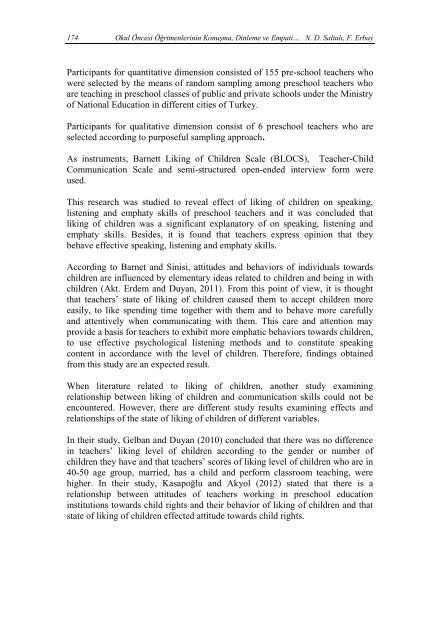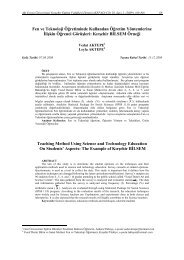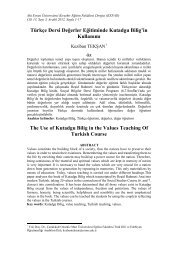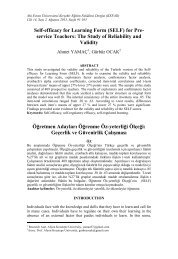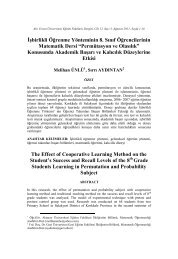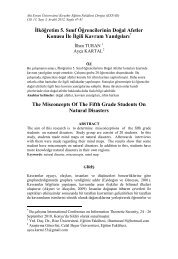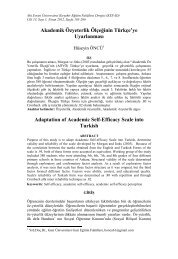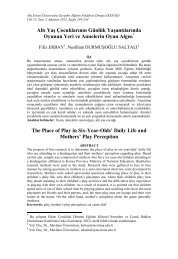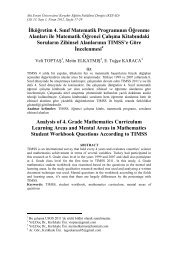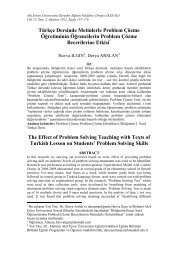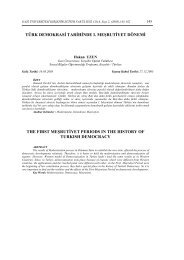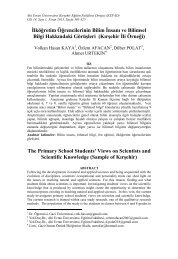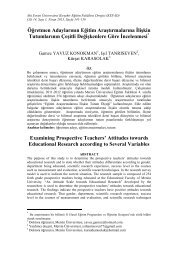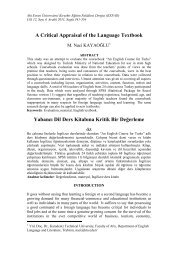Okul Ãncesi ÃÄretmenlerinin KonuÅma, Dinleme ve Empati ... - KEFAD
Okul Ãncesi ÃÄretmenlerinin KonuÅma, Dinleme ve Empati ... - KEFAD
Okul Ãncesi ÃÄretmenlerinin KonuÅma, Dinleme ve Empati ... - KEFAD
Create successful ePaper yourself
Turn your PDF publications into a flip-book with our unique Google optimized e-Paper software.
174 <strong>Okul</strong> Öncesi Öğrtmenlerinin Konuşma, <strong>Dinleme</strong> <strong>ve</strong> <strong>Empati</strong>… N. D. Saltalı, F. Erbay<br />
Participants for quantitati<strong>ve</strong> dimension consisted of 155 pre-school teachers who<br />
were selected by the means of random sampling among preschool teachers who<br />
are teaching in preschool classes of public and private schools under the Ministry<br />
of National Education in different cities of Turkey.<br />
Participants for qualitati<strong>ve</strong> dimension consist of 6 preschool teachers who are<br />
selected according to purposeful sampling approach.<br />
As instruments, Barnett Liking of Children Scale (BLOCS), Teacher-Child<br />
Communication Scale and semi-structured open-ended interview form were<br />
used.<br />
This research was studied to re<strong>ve</strong>al effect of liking of children on speaking,<br />
listening and emphaty skills of preschool teachers and it was concluded that<br />
liking of children was a significant explanatory of on speaking, listening and<br />
emphaty skills. Besides, it is found that teachers express opinion that they<br />
beha<strong>ve</strong> effecti<strong>ve</strong> speaking, listening and emphaty skills.<br />
According to Barnet and Sinisi, attitudes and behaviors of individuals towards<br />
children are influenced by elementary ideas related to children and being in with<br />
children (Akt. Erdem and Duyan, 2011). From this point of view, it is thought<br />
that teachers’ state of liking of children caused them to accept children more<br />
easily, to like spending time together with them and to beha<strong>ve</strong> more carefully<br />
and attenti<strong>ve</strong>ly when communicating with them. This care and attention may<br />
provide a basis for teachers to exhibit more emphatic behaviors towards children,<br />
to use effecti<strong>ve</strong> psychological listening methods and to constitute speaking<br />
content in accordance with the le<strong>ve</strong>l of children. Therefore, findings obtained<br />
from this study are an expected result.<br />
When literature related to liking of children, another study examining<br />
relationship between liking of children and communication skills could not be<br />
encountered. Howe<strong>ve</strong>r, there are different study results examining effects and<br />
relationships of the state of liking of children of different variables.<br />
In their study, Gelban and Duyan (2010) concluded that there was no difference<br />
in teachers’ liking le<strong>ve</strong>l of children according to the gender or number of<br />
children they ha<strong>ve</strong> and that teachers’ scores of liking le<strong>ve</strong>l of children who are in<br />
40-50 age group, married, has a child and perform classroom teaching, were<br />
higher. In their study, Kasapoğlu and Akyol (2012) stated that there is a<br />
relationship between attitudes of teachers working in preschool education<br />
institutions towards child rights and their behavior of liking of children and that<br />
state of liking of children effected attitude towards child rights.


